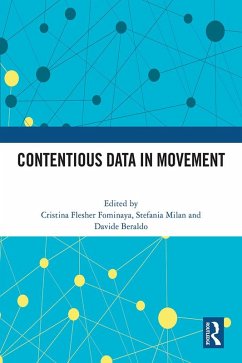
Algorithmic Life (eBook, PDF)
Calculative Devices in the Age of Big Data
Redaktion: Amoore, Louise; Piotukh, Volha
Versandkostenfrei!
Sofort per Download lieferbar
49,95 €
inkl. MwSt.
Weitere Ausgaben:

PAYBACK Punkte
25 °P sammeln!
This book critically explores forms and techniques of calculation that emerge with digital computation, and their implications. The contributors demonstrate that digital calculative devices matter beyond their specific functions as they progressively shape, transform and govern all areas of our life. In particular, it addresses such questions as: How does the drive to make sense of, and productively use, large amounts of diverse data, inform the development of new calculative devices, logics and techniques? How do these devices, logics and techniques affect our capacity to decide and to act?...
This book critically explores forms and techniques of calculation that emerge with digital computation, and their implications. The contributors demonstrate that digital calculative devices matter beyond their specific functions as they progressively shape, transform and govern all areas of our life. In particular, it addresses such questions as:
- How does the drive to make sense of, and productively use, large amounts of diverse data, inform the development of new calculative devices, logics and techniques?
- How do these devices, logics and techniques affect our capacity to decide and to act?
- How do mundane elements of our physical and virtual existence become data to be analysed and rearranged in complex ensembles of people and things?
- In what ways are conventional notions of public and private, individual and population, certainty and probability, rule and exception transformed and what are the consequences?
- How does the search for 'hidden' connections and patterns change our understanding of social relations and associative life?
- Do contemporary modes of calculation produce new thresholds of calculability and computability, allowing for the improbable or the merely possible to be embraced and acted upon?
- As contemporary approaches to governing uncertain futures seek to anticipate future events, how are calculation and decision engaged anew?
Drawing together different strands of cutting-edge research that is both theoretically sophisticated and empirically rich, this book makes an important contribution to several areas of scholarship, including the emerging social science field of software studies, and will be a vital resource for students and scholars alike.
Dieser Download kann aus rechtlichen Gründen nur mit Rechnungsadresse in A, B, BG, CY, CZ, D, DK, EW, E, FIN, F, GR, HR, H, IRL, I, LT, L, LR, M, NL, PL, P, R, S, SLO, SK ausgeliefert werden.













